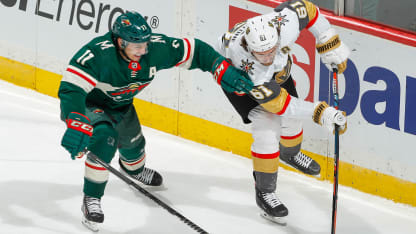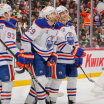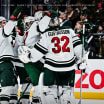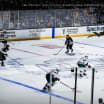Last summer, the COVID-19 pandemic forced the NHL to finish its season inside a pair of Canadian bubbles in Toronto and Edmonton.
It was a solid option to wrap up a season that had abruptly ended five months earlier.
But with the pandemic still clinging to every-day life in North America, it has forced the NHL to think outside the box in an effort to play a truncated 2020-21 season.
Temporary home: A look at the Wild's interim division
For one season only, Minnesota will play in the NHL's makeshift West Division

The most prominent of those ideas is a temporary re-shuffling of its divisions, as restrictions between the United States and Canada have forced the League to limit travel between the two neighbors.
And by limit, that means eliminate, at least during the regular season. The seven teams based in Canada will now form their own division, a vast grouping of teams that spans from Montreal to Vancouver.
It promises to add a fun dynamic to hockey north of the border this season, with ultimate bragging rights on the line amongst Canadian clubs.
But it also forced some difficult decisions in the U.S., most notably in the middle of the country, where there was plenty of uncertainty.
In order to maintain three even divisions consisting of eight clubs, that meant moving two of the Wild, St. Louis Blues and Dallas Stars west to compete against teams in the Mountain and Pacific time zones.
The other would play in a newly-designed Central Division that spans from Detroit all the way to South Florida.
Ultimately, the Stars ended up in the Central, so the Wild and Blues will join a familiar divisional foe in Colorado in a division featuring five Pacific Division rivals.
The top four teams, regardless of where they finish in the League-wide standings, will make the Stanley Cup Playoffs and play in a postseason format reminiscent of the old days of divisional playoffs.
Older fans will remember the 1990-91 North Stars, who finished fourth in the old Norris Division with a record that was 12 games under .500. But the Stars caught fire at the right time, advanced through the Norris Division playoffs and upended Edmonton in the Campbell Conference Finals before seeing their Cinderella run end at the hands of Pittsburgh in the Stanley Cup Final.
Every team's 56-game schedule will feature games only from each team's division, which means eight games against each of the seven clubs it will battle for playoff positioning.
Anything can happen in this format, so while things will certainly look different in 2020-21, that doesn't mean things will be boring. Quite the contrary, actually.
Here is a look at what the Wild's temporary home looks like heading into the abbreviated season:
Anaheim Ducks
2019-20 record: 29-33-9
2019-20 season in review: Last season was a forgettable one for the Ducks, who were one of just seven teams to miss out on a return to play in postseason bubbles. That's made for an extra-long offseason for Anaheim, which hasn't played a game since March 11. Fast fact: Anaheim's 4-2 loss to the St. Louis Blues that night was the last time the NHL played a game in front of fans. The following day, the League shuttered its doors until July.
What's the same: Anaheim is in a tough spot. The Ducks missed the postseason entirely but are not devoid of talent, both young and veteran. Captain Ryan Getzlaf begins his 16th NHL season, all with the Ducks, and if he stays healthy this season, he'll reach 1,100 games with the club. Along with Getzlaf, Adam Henrique (43 points) and Rickard Rakell (42) are the only Anaheim players to reach at least 40 points. Jakob Silfverberg (39) just missed. All are back this season. John Gibson will look for a bounce back in goal after posting a 3.00 goals-against average and .904 save percentage in 51 games last season.
What's different: Anaheim's biggest free agent splash came on the backend, where it added defenseman Kevin Shattenkirk to a young, talented and mobile defensive core. Former Minnesota State Maverick David Backes played six games for the Ducks late last season, but will be given every opportunity to be a difference maker up front.
Arizona Coyotes
2019-20 record: 33-29-8
2019-20 season in review: The Coyotes were on the periphery of the playoff picture when last season was shut down in March. Having won just five of their previous 10 games, Arizona had slid five points behind Calgary for the second wild card spot by mid-March.
Enter the return to play and expanded playoffs, however, and the Coyotes were one of 12 Western Conference teams to camp out in the Edmonton bubble. Arizona upset sixth-seeded Nashville in a Qualifier series in four games, but a date with Colorado in the First Round didn't go as well. The Avalanche answered the Coyotes' Game 3 win with a pair of 7-1 victories in Games 4 and 5 to officially end Arizona's season.
What's the same: After an offseason in which the Coyotes were constantly rumored to be trading captain Oliver Ekman-Larsson, Arizona didn't, instead hanging onto its top defenseman. Young forwards Nick Schmaltz and Clayton Keller still look like impact players moving forward, as does Connor Garland, who broke out for 22 goals last season. Familiar faces Phil Kessel and Derek Stepan also return looking to improve on sub-par seasons, at least by their standards. Darcy Kuemper and Antti Raanta will be a two-headed goalie monster for teams to compete against once again this season.
What's different: Arizona made a splash last season when it acquired Taylor Hall in a trade with the New Jersey Devils. That experiment lasted all of 35 games, as Hall signed a one-year contract with the Buffalo Sabres during the offseason. In terms of new faces in the desert, there aren't many. Former University of North Dakota star Drake Caggiula signed just this week. Another former Maverick, Centerville's Tyler Pitlick, inked a two-year deal back in October.
Colorado Avalanche
2019-20 record:42-20-8
2019-20 season in review: The COVID-19 shutdown spoiled a chance for the Avalanche to do something they had done just once since the 2002-03 season: capture a division championship. When the NHL hit pause on its season, Colorado's 92 points were just two behind Central Division-leading St. Louis.
Colorado won two of three in the round-robin round in Edmonton and played Arizona in the First Round of the Stanley Cup Playoffs, winning the series in five games. In round two, Colorado went the distance with Dallas, quite literally. The series went seven games, and went to overtime in Game 7. And as these have tended to go for the Avs over the years ... it didn't go well. Dallas won 5-4 to advance to the Western Conference Final, and eventually went to the Stanley Cup Final.
What's the same:A lot, and why not? When you're as good as Colorado has been the past couple of seasons, there isn't reason to make much change. Nathan MacKinnon, Gabriel Landeskog and Mikko Rantanen are all back. So are Andre Burakovsky and Nazem Kadri. On the back end, Cale Makar will try and build on an awesome rookie campaign. Bloomington native Erik Johnson is back as well. In goal, Philipp Grubauer and Pavel Francouz will compete for playing time with North Branch's Hunter Miska serving as the No. 3.
What's different: The Avs made a couple of targeted offseason acquisition, adding defenseman Devon Toews from the New York Islanders and forward Brandon Saad from Chicago. Saad has scored at least 21 goals in five of the past six seasons and brings some Stanley Cup credibility to the Mile High City.
Los Angeles Kings
2019-20 record: 29-35-6
2019-20 season in review: Among the seven teams that did not make a return to play, the Kings struggled for much of the season and wrapped up the 2019-20 campaign with 64 points, fourth-fewest in the NHL and one point more than San Jose for fewest in the Western Conference. Los Angeles did finish its season as the hottest team in the NHL. At the time of the COVID shutdown in March, the Kings had won seven consecutive games and were 8-1-1 in its previous 10.
What's the same: If the Kings are going to improve in 2020-21, much of that will have to come from within. Anze Kopitar, Dustin Brown and Jeff Carter will return up front, with Kopitar coming off a fantastic 21-goal, 62-point season a year ago. Drew Doughty is back on the blue line. Jonathan Quick will see a bulk of the play between the pipes. He'll be backed up by Cal Petersen and Troy Grosenick.
What's different: Defensman Olli Maatta was LA's lone notable offseason acquisition, at least in terms of NHL experience. He was added in a trade with Chicago. But the Kings' biggest splash was saved for the draft, where it jumped to the No. 2 overall pick and selected centerman Quinton Byfield. Because the Kings are a team in transition, the opportunity should be there for Byfield to play early and often, and whom better to learn from than Kopitar, who proved last season he can still play at a high level.
St. Louis Blues
2019-20 record:42-19-10
2019-20 season in review:Last season's defending champs didn't suffer from the same kind of Stanley Cup hangover that seems to befell teams once a new season rolls around. When the League shut down in March, the Blues had the best record in the Western Conference and their 94 points in the standings were second-most in the NHL behind Boston, the team St. Louis beat in the Cup Final two summers ago.
Unfortunately for the Blues, they couldn't find that magic once play resumed in the Edmonton bubble. St. Louis finished last among the four round-robin clubs, meaning a No. 4 seed and an eventual date in the First Round against the Vancouver Canucks, who knocked out the Wild in the Qualifying Round. The Canucks won the first two games of the series before the Blues responded with wins in Games 3 and 4. St. Louis was ahead 3-1 in the second period of Game 5, but surrendered the next three goals to the Canucks in an eventual 4-3 loss that set the table for a 6-2 defeat in Game 6, ending the Blues' hopes of a Stanley Cup repeat much earlier than most expected.
What's the same: Up front, the Blues bring back a number of rock solid veterans capable of lighting up the scoreboard on any given night, led by top-line centerman Ryan O'Reilly, who actually had a down year in the goal-scoring department a season ago. That was offset by Brayden Schenn, who scored eight more goals in one less game than he did the season prior. Perhaps the most important addition for the Blues will be a healthy Vladimir Tarasenko, who was limited to just 10 games last season because of a shoulder injury. There's no guarantee he'll be ready for the start of the season, but he should be back for a good chunk of it and will be one heck of an add whenever he returns to the lineup. Vince Dunn, Colton Parayko and Justin Faulk are among defensemen who return in front of goaltender Jordan Binnington, who will play a big part in just how successful St. Louis will be this season. He was good last year, but not nearly as spectacular as he was when he led the Blues to the Stanley Cup in 2018-19.
What's different:While St. Louis' defensive core is still amongst the best in the NHL, it will go about its business with a different look going forward. Gone is longtime stalwart and team captain Alex Pietrangelo, who signed as a free agent with the Vegas Golden Knights. In is Torey Krug, a free agent acquisition from the Bruins. It's likely a slight downgrade for the Blues, but that's a testament to the kind of player Pietrangelo remains at this point in his career. Krug is a solid replacement though and should make an already great St. Louis power play even more dangerous.
San Jose Sharks
2019-20 record:29-36-5
2019-20 season in review: In one of the most shocking developments of the 2019-20 season, San Jose was among the worst teams in the NHL. One of seven teams who did not make it to the postseason bubble, the Sharks wrapped up last season with 63 points, fewest in the Western Conference and better than only Ottawa and Detroit. Making matters worse was the fact that the Senators owned San Jose's first-round draft pick in October, so the Sharks didn't even have the opportunity to add an elite player near the top of the 2020 NHL Draft.
What's the same:The good news for the Sharks is that they still have some pretty good players already on the roster. Captain Logan Couture had 16 goals and 39 points in an injury shortened season. Like Couture, Tomas Hertl was very effective when he wasn't hurt. Timo Meier and Evander Kane are still outstanding players. On defense, Brent Burns and Erik Karlsson present perhaps the biggest conundrum for opponents when it comes to limiting offense from the back end. When they're on, no duo is more potent. Marc-Edouard Vlasic is solid too. The biggest question mark for the Sharks comes in goal, where Martin Jones will try once again, to resurrect a once promising career after another tough season. He'll have some familiar competition in that regard.
What's different: Joining Jones in the crease is former Wild goaltender Devan Dubnyk, who knows a thing or two about a trade potentially sparking a career resurgence. After five years in Minnesota, the Wild dealt Dubnyk to the West Coast where he will compete with Jones with the hopes that healthy competition brings out the best in both veterans. Another friendly face, Ryan Donato, joins the Sharks' forward group. It'll be interesting to see what kind of role he's able to carve out with the Sharks. He was an effective goal scorer in terms of production relative to ice time last season, tallying 14 goals in a mostly fourth-line role.
Vegas Golden Knights
2019-20 record:39-24-8
2019-20 season in review: Another season, another banner for the NHL's newest team, who will maintain their expansion status for one more season before the Seattle Kraken joins the fray. Vegas finished with 86 points during the regular season, capturing the Pacific Division crown. The Golden Knights 22 wins at T-Mobile Arena were the second-most home wins in the West and fourth-most in the NHL.
The stoppage did nothing to slow Vegas' roll into the postseason, where it went undefeated during round-robin play and earned the No. 1 seed in the Western bubble in Edmonton. The Golden Knights dispatched of Chicago in five games in the First Round, then got past the Vancouver Canucks in round two, going seven games to win that series. Vegas' run towards a second trip to the Cup Finals in three years of existence came up one round short, as Dallas won the conference final in five games. All four of the Knights losses to the Stars were one-goal defeats, with losses in Games 3 and 5 coming in overtime.
What's the same:Once again, the Golden Knights will boast one of the deepest forward groups in the NHL. Between Jonathan Marchessault, Max Pacioretty, Reilly Smith, Alex Tuch and the always underappreciated Mark Stone, the Golden Knights will are loaded on the wing. But will they have enough center depth? William Karlsson is solid but his 43-goal, 78-point season three years ago seems more and more like an outlier. Vegas has some good young pivots on the way, but are they ready for prime time? If not, finding an in-season solution won't be easy, as the Knights are tight against the salary cap. Marc-Andrew Fleury and Robin Lehner form arguably the top goaltending tandem in the NHL. Vegas just invested term and a healthy $5 million per season price tag into Lehner, so if a team with a sudden need for a goalie came calling, it wouldn't be surprising to see the Knights consider parting with Fleury, who has two years left at $7 million per.
What's different: Vegas' underrated blue line got a jolt of credibility after it signed former Blues captain Alex Pietrangelo to a massive seven-year contract. He's one of the top defensemen in the League, which will make the Knights back end one of the best as well. With Paul Stastny back in Winnipeg, someone is going to get a prime spot on the Knights' second line. Marchessault could move to center and make room for Tuch on the wing, but youngsters Cody Glass and Peyton Krebs could also make a roster push in training camp.

















